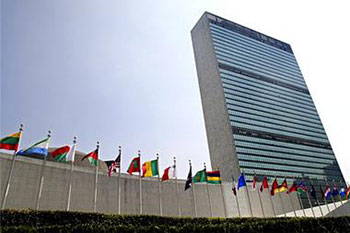MOSCOW, BEIJING, (ST) – Russia has stressed that the International Treaty for Regulating Arms Trade, approved by the UN General Assembly two days ago, needs more study as some of its articles are too vague, while China said that it lacks consensus which may expand differences.
The resolution adopting the landmark treaty was approved by a vote of 154 to 3, with 23 abstentions.
Syria, Democratic Korea and Iran voted against the treaty, while 23 countries abstained including Russia and China.
In a statement on Wednesday, the Russian Foreign Ministry said that additional study will specify whether joining the treaty will serve Russia’s interest or not.
The statement pointed out that “the treaty is based on countries’ commitment to set up regulations that control arms trade and illicit trafficking which may lead these arms to be at the disposal of terrorists and criminals who aim to escalate violence and armed conflicts.”
It clarified that the control system has been active in Russia for a long time ago with higher standards than those provided in the treaty.
For its part, the Chinese Foreign Ministry stressed that China supported reaching a treaty “acceptable by all”.
AFP quoted the Foreign Ministry spokesman Hong Lei as saying at a regular press briefing that insufficient consensus “may expand differences and may even create confrontation which is not helpful to the effectiveness and universality of the treaty”.
“It is because of the above that China abstained during the vote,” he added, pointing out that China’s decision to join the approving of the treaty will be made in the light of developments in China and the international situation.
In a speech he delivered during UN General Assembly voting on the draft resolution on the adoption of the draft Arms Trade Treaty, Syria’s Permanent Representative at the United Nations Bashar al-Jaafari said “we need a good treaty that we do not regret later that it is not politically exploited by some countries against each other.
Al- Jaafari said that Syria did not object to regulating the international arms trade, but opposed the draft because it did not refer to the arming of “non-state terrorist groups”.
Some of the countries behind the draft treaty, he said, were “fully engaged in supplying terrorist groups in Syria with all kinds of lethal weapons”.
H. Mustafa

